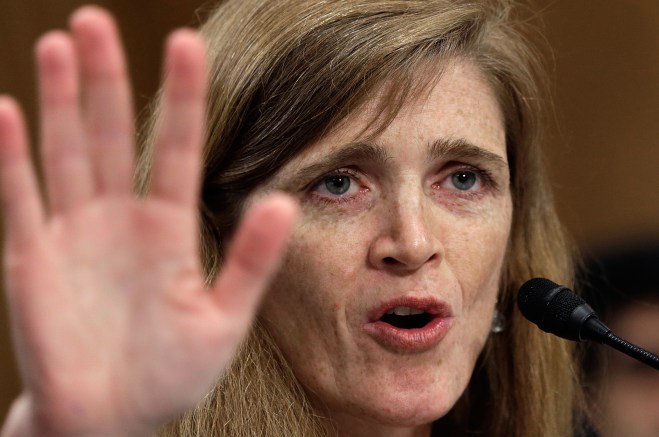In totalitarian states, it is not unusual to see public officials mouth official slogans and mantras that they do not fully believe in. It’s part of the kabuki dance required to maintain the status quo ideology that undergirds the entire polity. In democracies, there is, of course, no threat of physical coercion or imprisonment or torture or assassination if someone actually speaks truth to power, or simply speaks their mind. There is merely a reverse impulse against truth-telling: ambition. And since Robert Bork testified honestly in front of the Senate, and was effectively hounded from smeared by Ted Kennedy for doing so, no appointee has said anything but the minimal amount of horseshit to survive the process. Nomination hearings are a farce, an orchestrated dance of deception and banality, signifying nothing but grease on the political pole.
And so it’s as unsurprising as it is repellent to read Samantha Power’s testimony yesterday, in which she basically said anything she thought she needed to get approved, regardless of her past views, worldview, passion and intelligence. In that eternal contest between ambition and principles, there was, it turns out, no contest. Just capitulation to the powers that be. The main threat was from the neocons:
Mort Klein, head of the Zionist Organization of America, the nation’s oldest pro-Israel group, said he opposes Power’s appointment based on a 2002 comment she made suggesting the U.S. stop spending money on the Israeli military and instead invest billions of dollars in a new Palestinian state. Power recommended the U.S. send “a mammoth protection force” in order to create a “military presence” in Israel and rationalized that the move would alienate a powerful pro-Israel lobby in the U.S. which she referred to as “a domestic constituency of tremendous political and financial import.”
Yet yesterday, she all but sounded like a member of Netanyahu’s cabinet. David Rieff is as dismayed as I am:
Hers was, to put it mildly, a supremely chameleon-like performance.
In addressing Wyoming senator John Barrasso’s anxieties about recent UN efforts to forge a treaty on the international trade in small arms and the effect it might have on the virtually unfettered right of U.S. citizens to own rifles and pistols, Power was quick to concur that the Second Amendment was sacrosanct. On Israel, about which in some of her earlier journalism she had been somewhat critical, Power’s testimony was, to the senators’ evident satisfaction, so stridently one-sided as to be almost wholly indistinguishable from the talking points of Israeli diplomats.
Her prepared statement emphasized the United States had “no greater friend in the world than the State of Israel,” when a more clear-eyed assessment surely would be that it is the other way around. And she went on to say that addressing the “disproportionate” critical focus on Israel would be a central priority for her. Later, in an answer to a question, Power opined that the real reason Israel is so often singled out for such criticism at the UN is because “50 percent of the countries [there] are not democratic.”
Who came up with that? Charles Krauthammer? Bill Kristol? But it was what Rand Paul rightly called non-responsive responses that stick in the throat. Rieff again:
Power conceded at the hearing that her “perspective” on a number of important questions had been changed by “serving in the executive branch.” But whatever her real views now are, they were nowhere in evidence either in her prepared statement or in her responses to senators’ questions.
Senate hearings are, effectively, a tragicomedy of vacuity. But boy, did Samantha Power know her part well.
(Photo: Samantha Power, the nominee to be the U.S. representative to the United Nations, testifies before the Senate Foreign Relations Committee on July 17, 2013. Power has received broad bipartisan support for her nomination. By Win McNamee/Getty Images)
